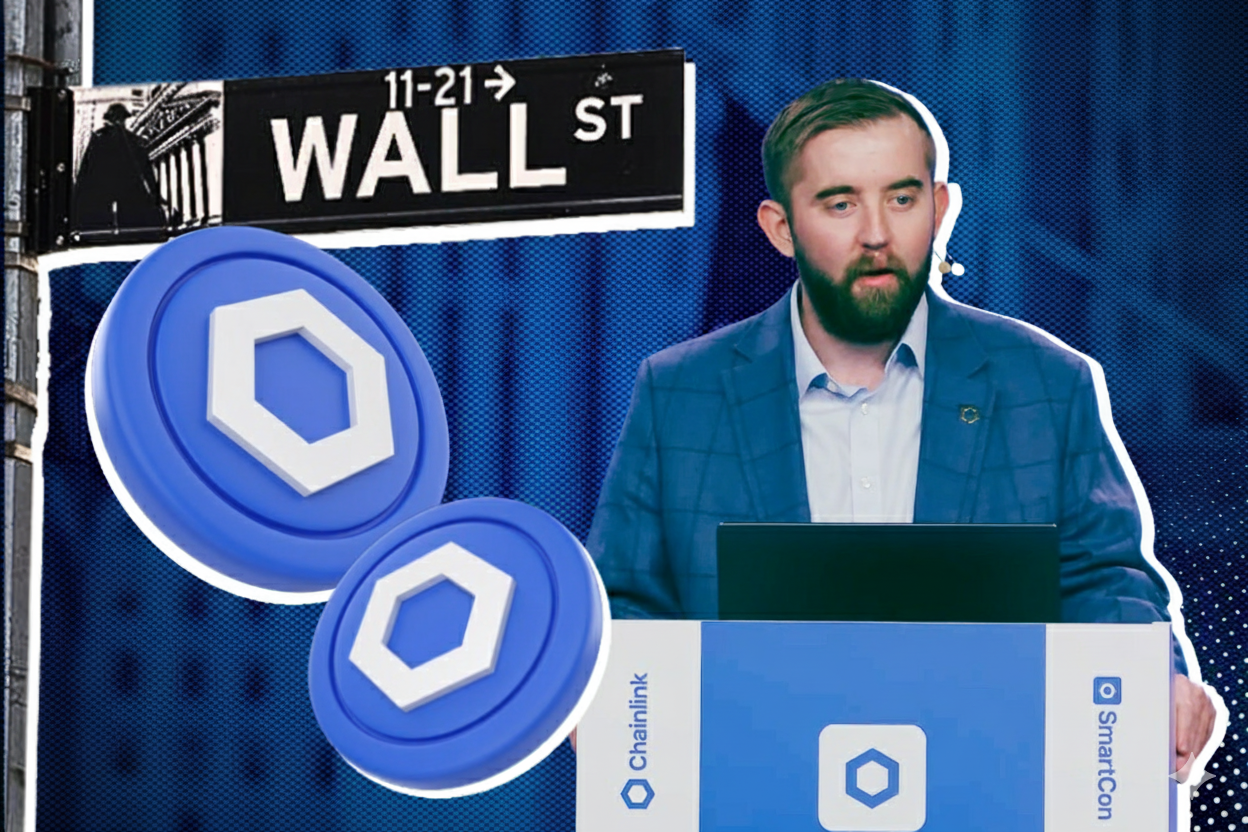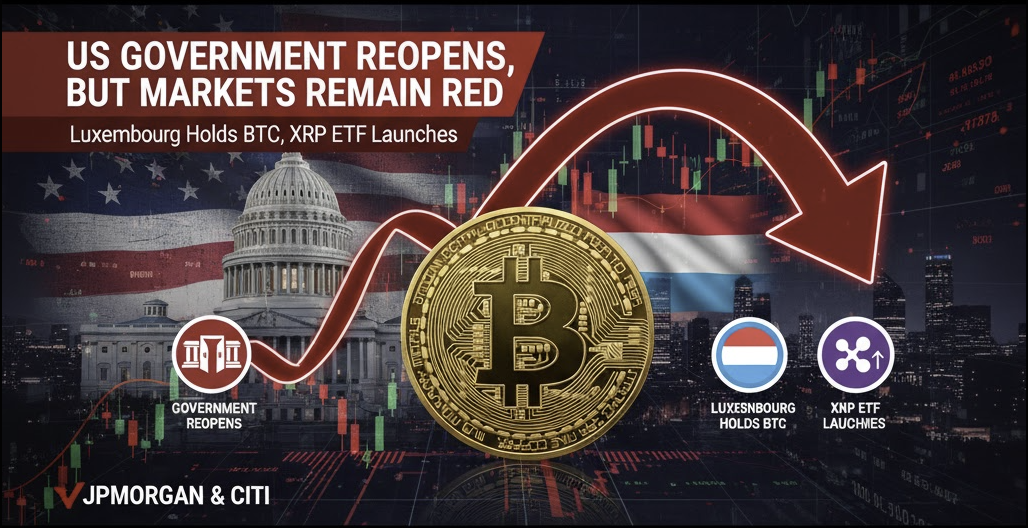Financial and crypto markets are seeing notable volatility as US and European bond yields rise, putting pressure on stocks while making gold and Bitcoin attractive safe havens. In this context, numerous global businesses and institutions continue to accumulate Bitcoin, Ethereum, and other crypto assets, while expanding the use of cryptocurrencies in payments and asset management.
Market Overview
US equities closed down on Tuesday (September 2nd, US), the first trading day of the week, with all three indices falling by over 0.55%. Stock futures were mixed, with Dow futures seeing a slight decrease while the other two indices rose slightly. Gold and oil both saw increases, reaching $3605 per ounce and $65.6 per barrel, respectively.
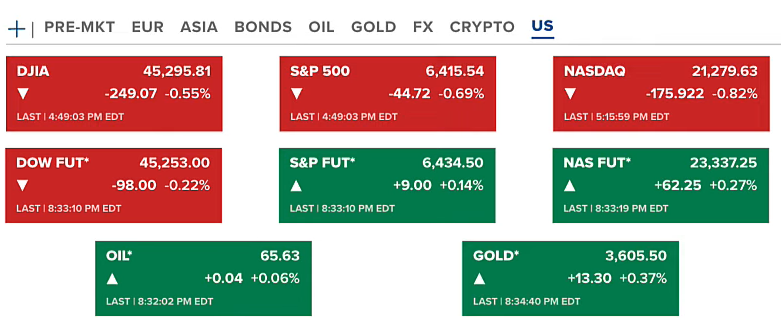
Bitcoin is hovering around $110,000, returning to its price before last Friday's correction. Most major altcoins are trading sideways or seeing slight gains/losses. The overall crypto market capitalization stands at $3.9 trillion.
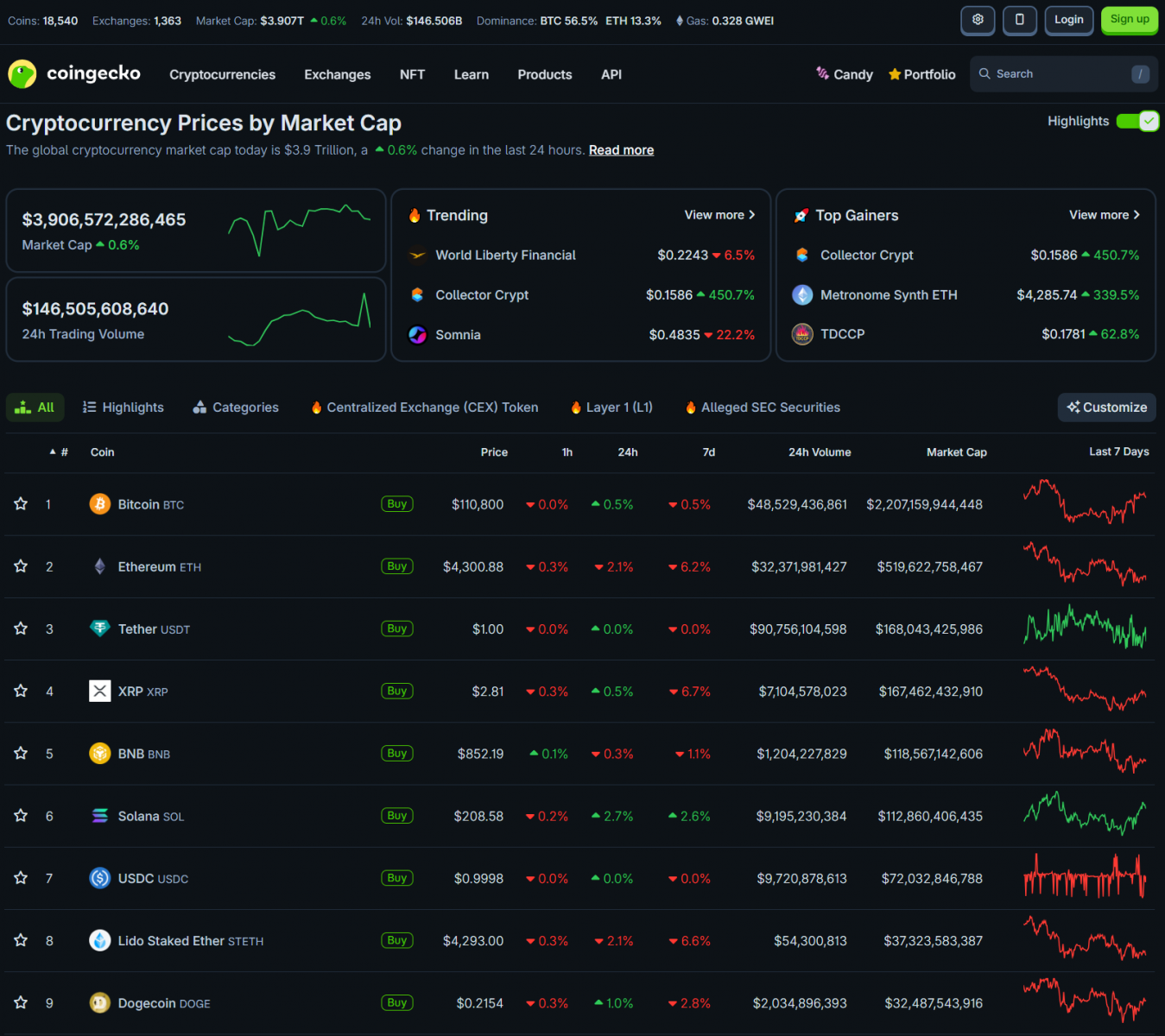
US BTC spot ETFs saw positive inflows of $332.8 million on Tuesday. Meanwhile, ETH spot ETFs had $135.3 million in outflows, a significant drop from previous sessions.

The Surge in US Bond Yields
In recent days, the market's focus has been on the continued surge in US government bond yields. The 30-year bond yield has surpassed 4.97%, and the 10-year bond yield has reached 4.28%. This increase is believed to be related to a recent appeals court ruling that most of President Donald Trump's tariffs are illegal. This ruling could force the US government to refund billions of dollars in tariff revenue, leading to the need for additional borrowing to compensate. The government borrowing in a high-yield environment means it must pay higher interest rates, which increases concerns about budget deficits and national debt. Financial markets, including stocks and gold, are reacting strongly to this news, with stocks declining and gold appreciating.
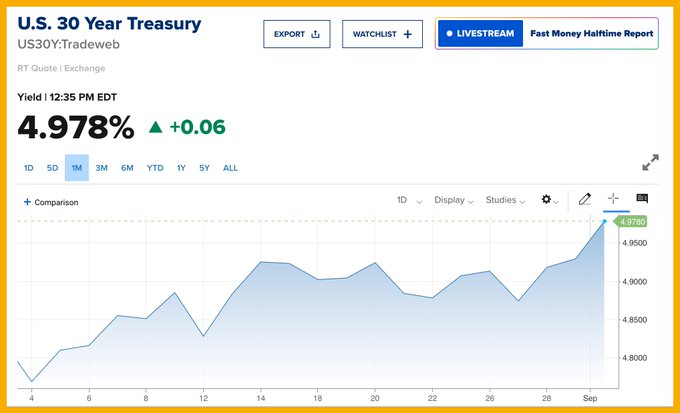
The pressure of public debt is not limited to the US but has also spread to Europe, where German and French bond yields have also climbed to their highest levels in 10 years. This has caused stocks to dip while gold and Bitcoin have surged, as they are seen as safe havens against the risks of inflation and financial instability.
However, these market reactions are only short-term fluctuations based on news. The final decision on the tariffs has not been made, as the case is being appealed to the Supreme Court. The Supreme Court may not agree with the appeals court's ruling, and even if it does, some industry-specific tariffs may still be considered legal. Therefore, the actual impact remains unknown.
In the long term, fundamental factors are much more important than immediate news. The continuous rise in global public debt in the US, China, and Europe, etc., is a worrying trend. When governments constantly borrow and print money, the total amount of circulating currency in the market (measured by M2 money supply) increases. And many believe that the price of BTC and other assets are directly correlated with the M2 money supply, with a continuing upward trend in M2 making many optimistic about the future prices of BTC and other assets. When more money chases a relatively fixed supply of assets, the price of those assets tends to increase over time. This is a fundamental factor for long-term investment in assets like gold or Bitcoin, regardless of short-term news-driven volatility.
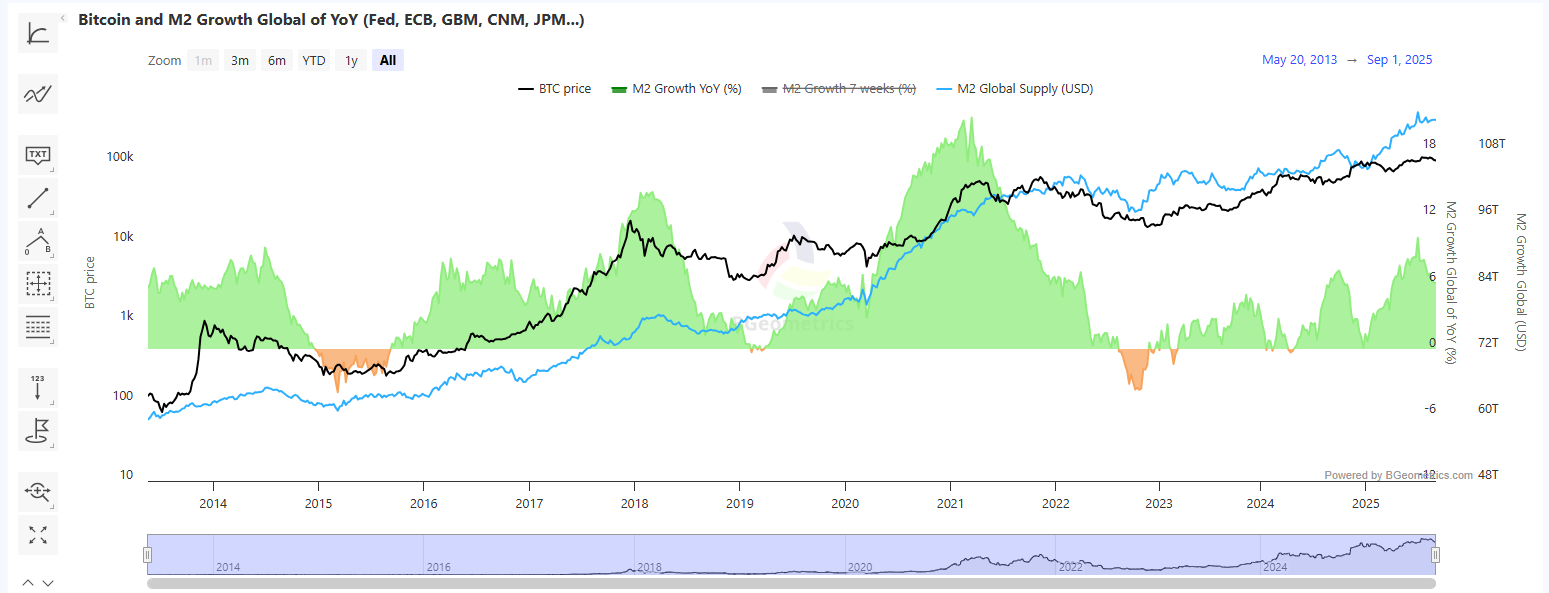
The market is currently paying close attention to upcoming economic data, especially the jobs report on Friday and the CPI index next week. These data points will either reinforce or change predictions about the likelihood of the Federal Reserve (Fed) cutting interest rates at its September meeting. Currently, the probability of a Fed rate cut is very high, which could continue to influence financial markets.
The Proliferation of Crypto in Corporate & Global Finance
Companies and institutions worldwide are accelerating their accumulation and adoption of crypto, reflecting the rapid growth of the crypto market. In Japan, Metaplanet has just had a large-scale capital-raising plan approved by its shareholders to pursue its Bitcoin accumulation strategy. The company plans to issue up to 2.7 billion shares, including Class A shares with high security and fixed dividends, providing stable income, and riskier Class B shares that can be converted into common stock if the Bitcoin strategy is successful. With this structure, Metaplanet can raise up to $3.7 billion while limiting dilution for existing shareholders, with the goal of holding 210,000 Bitcoin by 2027. The company is already among the six largest global enterprises by Bitcoin reserves.

Meanwhile, Strategy continues to expand its treasury, having just bought an additional 4,048 BTC worth approximately $449.3 million at an average price of $110,981 per BTC. This brings its total holdings to 636,505 BTC (about $46.95 billion) with an average cost basis of $73,765 per BTC, achieving a 25.7% gain year-to-date in 2025 and affirming its position as one of the largest Bitcoin investors in the market. Similarly, France's Sequans Communications has bought an additional 34 BTC (~$3.8 million), raising its total to 3,205 BTC (about $374 million) with an average cost basis of $116,653 per BTC. SharpLink added 39,008 ETH, now holding 837,230 ETH (about $3.6 billion). CEA Industries Inc. (Nasdaq: BNC) also intensified its investment in BNB, buying an additional 38,888 BNB (about $33 million) to raise its total holdings to 388,888 BNB (about $330 million), with the goal of owning 1% of the total BNB supply by the end of 2025.
In parallel with accumulation, the acceptance of crypto payments is also accelerating. In the UAE, RAK Properties, one of the largest real estate companies, will start allowing customers to pay with Bitcoin, Ethereum, Tether, and other cryptocurrencies. The payments will be processed by Hubpay, which will convert them to local currency before depositing them into the company's account. This move reflects the rapid growth of crypto adoption in the UAE, which has a clear legal framework and does not tax profits from cryptocurrencies. This solidifies the nation's position as a global hub for crypto and Web3, with the potential to become the second-largest sector after oil and gas within the next 5 years.
Thailand's Ministry of Finance is launching the G-Token program, issuing government bonds as digital tokens. Each token is backed by the baht and has a fixed interest rate, making it easy for even small investors to participate. KuCoin's Thai branch will handle registration, withdrawals, and token trading, in partnership with local partners like XSpring Digital, SIX Network, and Krungthai XSpring. The bonds will be listed on domestic exchanges and may expand to KuCoin's global platform after approval. The entirety of this picture shows that the crypto market is not just an investment tool but is also gradually becoming a payment method and a strategic asset for businesses and large organizations worldwide.
Other Key Crypto & Market Updates
A federal judge has ruled that Google can continue to own its Chrome browser, rejecting the US Department of Justice's request for Google to divest from Chrome. However, the ruling prohibits Google from signing exclusive contracts. This ruling was made after the judge determined that Google held an illegal monopoly in the field of internet search last year.
The Ethereum Foundation (EF) sold 10,000 ETH, valued at approximately $43 million, through small transactions on a centralized exchange to ensure a reserve of fiat currency for its funding activities. This is part of a new treasury policy enacted in June 2025, which allows for the management of ETH reserves and operational spending while limiting the impact on ETH's price. After the sale, the EF still holds 231,600 ETH (~$995 million), and although ETH fell by 1%, institutional demand remains strong.
The two largest US financial regulators, the SEC (Securities and Exchange Commission) and the CFTC (Commodity Futures Trading Commission), have issued a joint statement that US law does not prevent regulated exchanges (such as stock or futures exchanges) from listing crypto trading, even with leverage or margin. This means that in the future, traditional financial exchanges could also begin offering spot crypto trading services, competing directly with crypto exchanges like Coinbase or Kraken.
Sources
- Bloomberg
- CoinDesk
- U.S. Treasury
- TradingView
- Reuters
- SEC
- Metaplanet Investor Relations
- Sequans Communications Investor Relations
- SharpLink Gaming Investor Relations
- CEA Industries Inc. Investor Relations
- RAK Properties
- KuCoin
- Google Legal Filings
- Ethereum Foundation
- The Wall Street Journal
Disclaimer
This article is for informational purposes only and should not be considered financial advice. Please do your own research before making investment decisions.


.png)



